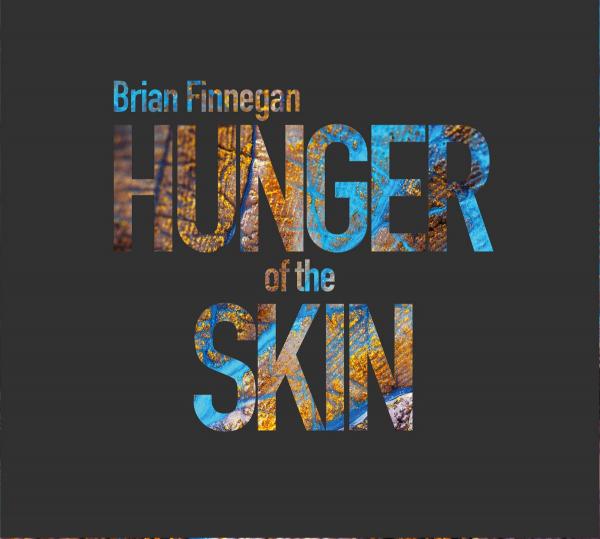June 22, 2021

•Brian Finnegan, “Hunger of the Skin” • Look, it’s pretty clear that many, if not most, music recordings dating from roughly late 2019 to now, and probably into next year, are going to have at least some pandemic-related association, explicit, overt, or implied. Those earliest in the timeline may exhibit a summer-before-the-war kind of character to them, to be plumbed for signs and portents (real or implied) of the upheaval to come. Most everything after that is about coping with or capturing the zeitgeist of the pandemic and its effects, micro and macro, personal and societal. Of course, these recordings can and should be judged on artistic merits, but other criteria will revolve around what aspect of the pandemic the artist chooses to explore, and how successful he, she, or they are at doing so.
Which brings us to “Hunger of the Skin,” the brainchild of Armagh native Brian Finnegan, best known for his phenomenal flute and whistle playing as part of the trad-rooted but label-defying Irish-Anglo quartet Flook. As the first pandemic lockdown took hold, Finnegan was struck by what he calls the “recalibration of life” that followed, in particular the diminution of intimacy – not only the near-absence of physical closeness of love and friendship but also the emotional and intellectual stimulation in human contact: “shared mind, stories, music, and dreams, of real connection, not virtual, and real embodied joy.” So, he set about composing an assortment of pieces to express what he and so many others were experiencing and enlisted more than two dozen musicians and vocalists around the world to help him make “Hunger of the Skin” a reality.
It’s not just that the album is exquisitely arranged and full of outstanding musicianship – five of the tracks interpolate recitations of poems. Throughout there is an urgency to it, sometimes at the forefront, sometimes below the surface but always present: The “Hunger” in the title is quite appropriate. Finnegan is the driving force, of course, with his unparalleled mastery of both flute and whistle – yes, he plays fast, but the way he can articulate, shape, curl, and bend notes so clearly and flawlessly is a thing of beauty.
Finnegan’s flute and whistle, and some of the guest musicians – including his fellow Flook members Sarah Allen (alto flute), Ed Boyd (guitar), and John Joe Kelly (bodhran) – constitute the Irish strand amidst the weaving together of different musical genres and nationalities: funk and rock in “Dust/An Damhsa Dubh”; jazz (with a trombone solo by Paul Dunlea), and a bit of electronica on “Fathom”; a gorgeous interlude by Indian sitar player and vocalist Sheema Mukherjee on “Chase the Shouting Wind,” set against Ian Stephenson’s rumbling electric bass and crashing percussion by Liam Bradley, both of whom provide an invaluable rhythmic foundation all through the album; and several tracks are graced by string arrangements from Patsy Reid and Niamh Dunne.
But it’s the ubiquitous Sean Og Graham – perhaps the Donal Lunny of his generation – who deserves special notice: He not only contributed guitars, keyboards, mandolin and a few other instruments on the tracks but he also was Finnegan’s right-hand man in producing and engineering the album, which involved integrating multiple remote recordings from the other musicians.
A highlight of the album is “Flow, in the Year of Wu Wei,” which starts with a quintessential Finnegan tour-de-force – accents and syncopations to the fore – over a smooth-as-silk guitar backing by Graham and a quiet-but-rocking drum part by Bradley, gradually evolves into an exotic whirligig with Anton Boiarskikh’s trombone adding to the colorful palette, and finally eases into a meditative state. “Trigger’s Lament/Jig for Amélie/Red Plant Blues,” meanwhile, comes closest to the Flook template, not least because of Kelly’s versatile bodhran beats.
As expressive and emotive as the music on “Hunger of the Skin” is, it’s the voices and words that truly animate the album, and reinforce its imploration for us to remember our humanity, in death as well as life. Gearóid Mac Lochlainn offers his “Dust/An Damhsa,” written in Gaelic, which includes the lines: “Worlds fall apart/You come out of the void/A wail from the heart of the universe/Welcome, to the black dance.” Boris Grebenshikov intones, in Russian, his “Bird Crusade” during “Flow, In the Year of Wu Wei”: “So word becomes flesh/flesh becomes dust/and lips are burnt/with the fear of dumbness/but in the eyrie of summer stars/here, at the end of the road/oh, my joy/who, if not you?” During “Crossing the Rubicon/Ollin” – with Reid’s plaintive strings giving assent – Northern Irish singer/songwriter Colum Sands reads “The Coming of the Light” by Mark Strand: “Even this late the bones of the body shine/and tomorrow's dust flares into breath.”
It is “Dare,” a musing on vulnerability, strength, and compassion written and delivered by Finnegan’s sister Morna that, in addition to being excerpted during “Fathom,” serves as the album’s coda on the final track:
“If all the years
on all of earth
in all of time
reached out their hand,
and circled back again,
and lived?
They have.
Put out your hand.
Touch what you love.”
[brianfinneganmusic.com]

